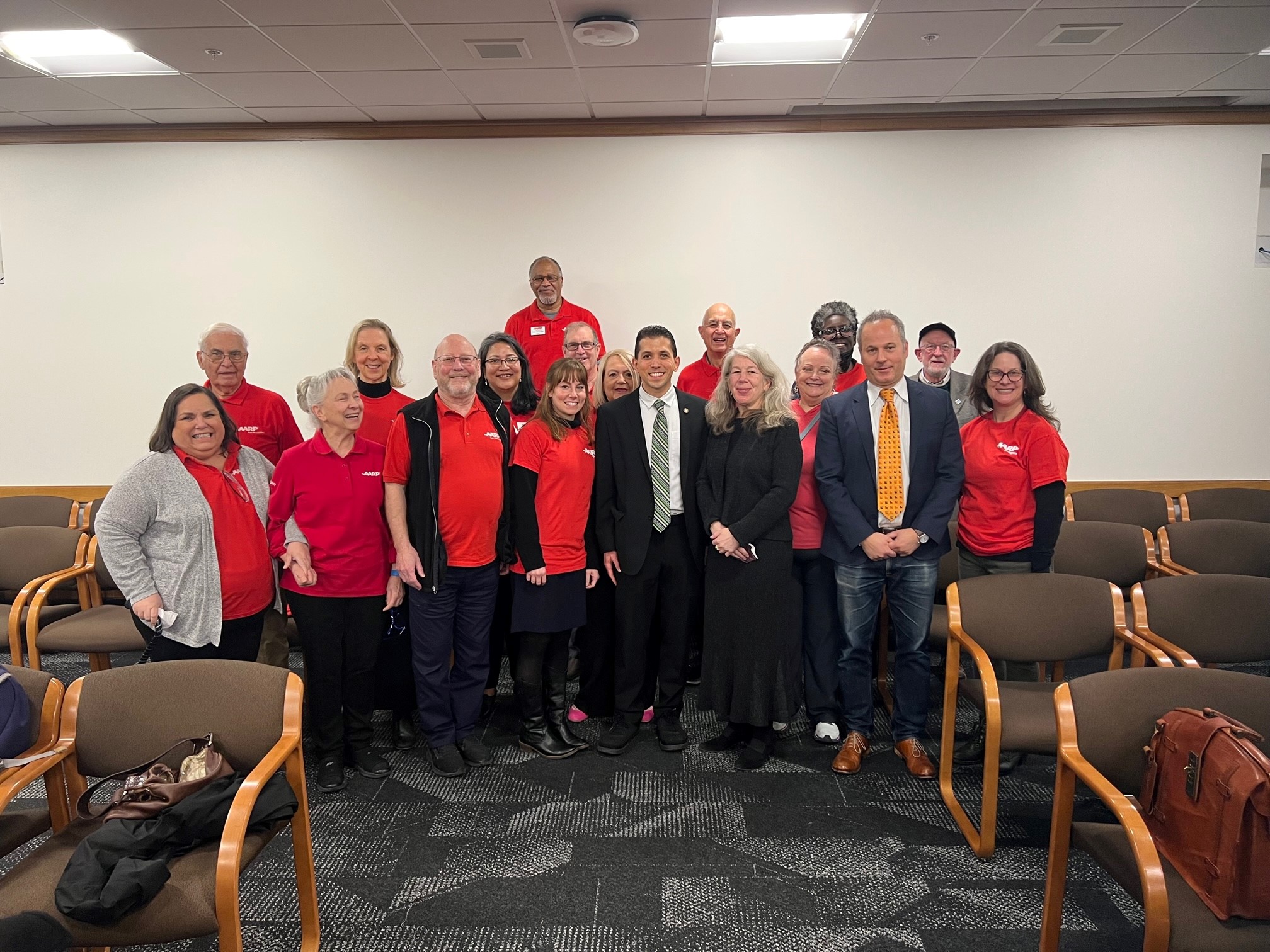AARP Hearing Center
2023 State Legislative Session Advances AARP Oregon Priorities

AARP Oregon advocates for what is important to our members and older Oregonians. With the help of our legislative advocate volunteers, AARP members, staff leadership, and in concert with our partners, we worked tirelessly to advocate on a broad range of issues to improve the lives of older Oregonians and their families. This session we encountered plenty of “firsts” — the constant noise of construction as our Capitol undergoes major renovation, the longest walk-out (6 weeks) by a majority of the Senate Republicans, the largest class of newly elected legislators, and a new Senate President and Speaker of the House. By the end of session, we had successfully advanced important policy changes to help Oregonians 50+. Where we weren’t successful, we will continue our efforts in upcoming sessions.

Fixing Oregon’s Workplace Age Discrimination (HB 2800)
As a result of federal court decisions, making it much more difficult to prove age discrimination compared to any other form of workplace discrimination, we have prioritized updating our state workplace age discrimination law. We know that more than 62% of Oregonians 40+ in the workforce have seen or experienced age discrimination. Older workers also face barriers in finding employment because of their age. Our proposal would have updated the definition of age in Oregon’s workplace discrimination law to include retirement and pension status, salary and benefits when used as a proxy for age, prohibited requiring job applicants to provide their age or graduation dates prior to an initial interview, and prohibited employers from using coded age-biased job descriptions that seek applicants based on their younger age (such “digital natives” and “college-age”).

We garnered 36 legislative bi-partisan sponsors, endorsement by more than 20 organizations, and support from almost every House Democrat, but unfortunately we had no House Republican support and our opponents, led by Oregon Business & Industries, successfully peeled off a few business-friendly House Democrats. We had a great hearing in the House Business & Labor, led by our champion legislators Reps. Nathan Sosa and David Gomberg, as well as Sens. Deb Patterson, Kayse Jama, and James Manning Jr. AARP advocates, all wearing red shirts, filled the first few rows during our testimony, along with testimony in support from other advocacy organizations and our Attorney General Ellen Rosenblum. While we were not successful this session, we are not done. This issue is too important, and we will continue our efforts until we bring equity and fairness to our age discrimination law for older Oregonians.
Consumer Protection
This session we joined a group of organizations advocating in support of a package of consumer protection bills. While not all passed, we are pleased with the advances made this session and look forward to enacting more protections in future sessions.

Recovering Loss from Natural Disasters (HB 2982)
The legislature heard from homeowners who lost everything to wildfires in the past few years, with heartbreaking stories of the difficulties they faced when trying to complete the detailed inventory required to obtain coverage under their home insurance policies. Indeed, how many of us would be able to account for all the belongings in our home, let alone provide the necessary documentation to receive adequate compensation? HB 2982, led by Rep. Pam Marsh with bi-partisan support, allows homeowners who lose everything as a result of a major disaster to opt for collecting 70% of their policy coverage in lieu of inventorying every item. Although, as we testified, we would have preferred a higher percentage, we are very pleased at as Oregon is now one of only three states to provide this option and at 70% ours provides the highest coverage.

Data Broker Transparency (HB 2052)
Most of us are not aware of companies called “data brokers.” They are companies with no direct relationship with the consumer but collect and purchase information about us from retailers, credit card companies and public records. Data brokers then bundle that information along with personal information such as birth date, relationship status, education, religious and political views, gender, race and income and sell to advertising and insurance companies. We were pleased to testify in support HB 2052, brought forward by Attorney General Ellen Rosenblum. It requires these companies, largely unregulated, to register with the Oregon Department of Consumer & Business Services and provide consumers with information including, if applicable the method for the consumer to request an opt-out.

We testified in support of both HB 3242 to update Oregon’s Unfair Claim Settlement Practices Act to include insurance companies, so individuals who are harmed by insurance company acts, already deemed unlawful, can seek full access to courts and recovery beyond what was allowed in the policy and HB 3243, an update to Oregon’s Unlawful Trade Practices Act to include insurance companies, the one consumer product not currently covered. Unfortunately, although close, neither made it over the finish line but we will be back to support future efforts to bring necessary protection to Oregon consumers.

Housing Stability & Choices (HB 2001 & HB 3309)
One of the priorities this session at the Capitol was addressing the housing crisis. Continuing our commitment to affordable and accessible housing, we supported various bills to provide rent and eviction protection, culminating in testimony in support of an omnibus package which received bi-partisan support. It implements a housing needs analysis, modifies emergency housing and homeless assistance programs, provides improvements to Oregon’s eviction statutes to promote stability and payment rather than displacement and eviction and provides grants and loans for the construction of low-cost modular housing in wildfire affected areas. In addition, significant funds were allocated in various budget bills to fund emergency rent assistance and homelessness prevention.
Another success this session was the passage of legislation that will direct the Oregon Housing and Community Services to track how many accessible units are built by unit type and annually report the data to the legislature. Accessible design features include no-step entries, single floor living and extra-wide hallways and doors, making them livable for a lifetime. As we testified, we know very few homes are accessible so we hope this data will provide the necessary information to guide policy makers to identify incentives to increase the number of accessible units our communities need.

We also testified in support of HB 3032 that would have allowed Oregonians who want to rent a room in their home to receive a personal tax credit of not more than $12,000 annually. This program benefits older Oregonians who want to stay in their community, whether as the owner of the home that is now too large or as renter who needs to downsize or prefers to not live alone. Unfortunately, despite bi-partisan support, it did not pass this session.

Age Friendly State: health, financial security, and livable communities (HB 2869)
With an opportunity at hand mid-way through session and with bi-partisan support we worked with O4AD and Age+ to amend and then testify in support of HB 2869 to advance our efforts for Oregon to begin working on a multi-sector plan on aging that elevates Oregon as an age friendly state. It would have established a workgroup through the Oregon Department of Human Services composed of services providers, education, businesses, philanthropy, local governments, health and behavioral health care providers and consumer advocates to develop a framework for a multi-sector plan and report back to the legislature in 2024. Because HB 2869 had a fiscal of $400,000 it went to the Joint Committee on Ways & Means and like many other bills it failed to get the necessary funding and did not pass this session. Despite not passing the bill, legislators are now hearing about the important work we need to do as a state to plan for our future.

Prescription Drugs (SB 192)
This session was relatively quiet on the prescription drug front. We testified in support of expanding the authority of the recently created Prescription Drug Affordability Board (PDAB). Ultimately the bill was amended to be a more modest effort and requires the PDAB to develop and report to the legislature its plans for establishing upper payment limits for the highest costing drugs, including analysis of potential savings or costs for state insurers, hospitals, pharmacies and consumers. Oregon’s efforts to enact a fully functioning PDAB may take a while, but we will continue to look for opportunities to help Oregonians address the high cost of prescription drugs.

Long-Term Care & Caregiving (SB 99 & HB 5026)
This session we had opportunities to support protections for older Oregonians both residing in long term care facilities as well as those who receive assistance from family caregivers. SB 99 creates an LGBTQIA2S+ Bill of Rights in Long Term Care facilities. It also requires training of providers and establishes a subcommittee of the Governor’s Commission on Senior Services. As we testified, we know that older LGBTQIA2S+ adults face unique barriers and discrimination as they age and this legislation, supported by a broad array of stakeholders would provide critical protections.
In addition, we successfully advocated for inclusion in the Aging & People with Disabilities budget funding for a soon to be created program to provide respite support services to family caregiver if they are providing care to an older Oregonian receiving assistance through Oregon Project Independence (OPI). OPI allows older adults to stay in their home through the assistance of home care workers and in many cases that includes support from a family caregiver. However, currently there is little support for the caregiver and this would provide resources to help them. We continue to work closely with the Alzheimer’s Association as we await final approval from the federal government for the necessary waiver to implement this expanded program.

































































